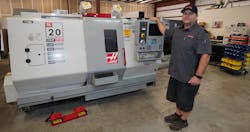Curt Doherty, CEO of CNC Machines, has about a dozen full-time employees to receive, prepare and resell the machining equipment cutting, shaping, and forming America's way back to manufacturing prominence. He started out in the early 2000s snapping up auctioned units from liquidating machine shops when so many manufacturing jobs moved to China. Now orders are coming back and that has kept the company he started in 2014 very busy. Moving inventory isn’t the problem anymore; finding suitable workers is.
The Florida-based reseller has 60,000 manufacturers in its database and Doherty says none are immune from the skills gap created when all those trade jobs went away and the talent pool was not refreshed.
"I don’t think I've run across anybody who said, 'We got too many people to hire here,'" he says. Their problem is just finding people who are skilled. They can find button-pushers, but they can’t find problem-solvers."
Interviews with prospects just out of school sometimes last less than minutes, Doherty says, as that's how little time it takes for them to sink their chances by prematurely veering the conversation to "What are you going to do for me?"
"I have a much harder time hiring from colleges because there is way more entitlement," Doherty says. "They just have higher expectations."
The Millennials and younger he has hired are working out great, but "I had to weed through a lot more to find those," Doherty says.
In his experience, Doherty has found one surefire way to get employees with the right set of skills to succeed in a demanding, highly versatile workplace: Check their military veteran status.
"Here' the thing with veterans, Doherty says. "As long as you give them a clear mission and what their job title is, make sure they have the right training and support, they tend to be very self-sufficient."
Veterans, he observes, also have an embedded sense of selflessness.
"They don’t just do it for commission," Doherty says. "[The work is] bigger than themselves. That comes hardwired from the military."
They are also hardwired for adaptability, which is vital in the machining world. Switching from Mazak to Fadal machines can be like learning a new language, Doherty says. What a worker has learned on affects what machines job shops invest in over capabilities and effectiveness. Due to their discipline and years of following instructions, learning new technology doesn’t become an impediment.
"It doesn’t matter what you throw in front of them; they are going to figure it out," Doherty says.
A few of the specific, manufacturing-friendly skills Doherty says vets possess:
- Ability to quickly learn new skills and concept
- Attention to detail
- Leadership
- Teamwork
- Grace under pressure
- Respect for procedures
- Being attuned to global and technological trends
- Adherence to health and safety standards
All of these are inherent in CNC Machines' head of service, David Wilkes, Doherty says.
"He's my Swiss Army knife and oversees everything," Doherty explains of the former Pfc. Wilkes, who operated a Vulcan cannon in the Army during the 1990s. Wilkes now runs the machine logistics, checks them in, manages their cleaning and repair, and performs final checks and customer demos.
"As a machinist I got to use a lot of the skills I learned in the military, such as my attention to detail, my organizational skills and even leadership skills," Wilkes says.
Wilkes, who quickly climbed the ranks at CNC Machines, came to the job from a repetitive job at a firearms manufacturers where Doherty says he didn’t have a lot of leeway to approach the work, though he has "flourished" now that he can apply the problem-solving skills he learned in the military.
There was only one big issue the CEO has had with this particular veteran.
"He was coming in early and not clocking in because he didn’t want to take advantage of the company and get overtime," recalls Doherty, adding he also took short lunches to get back to work. "And I said, 'I appreciate it but legally I need to pay you the overtime.'"
The company also had a former Marine on the sales team who had to deal with an extremely difficult customer, but his experience helped him always keep professional demeanor. When asked if he was OK after the call, Doherty says the vet replied, "Curt, I've been shot at. I'll be fine."
Like any high-performing asset in your plant, veterans require some additional monitoring because of their experiences. One combat veteran that Doherty hired who "had a ton of potential" had to cut his time short due to PTSD concerns.This is something for medical professionals to diagnose, but you can upskill your knowledge on the subject here.
The U.S. Department of Veterans Affairs says 11-20% of veterans who served in Operations Iraqi Freedom (OIF) and Enduring Freedom (OEF) live with PTSD in any given year. It's also treatable and like any issue in a machine shop or factory, can be managed with the right preparation.
Doherty says due to the overwhelming positive experiences with veterans, his company is offering three $1,000 scholarships for veterans applicable for a certificate, associate's or bachelor's degree in manufacturing. The winning vets just have to submit the most compelling essay and their DD214. Click HERE to apply. Deadlines are Feb. 5, March 5 and April 5, 2019.
And if you need further convincing, check out this video from the Manufacturing Institute:
About the Author
John Hitch
Senior Editor
John Hitch writes about the latest manufacturing trends and emerging technologies, including but not limited to: Robotics, the Industrial Internet of Things, 3D Printing, and Artificial Intelligence. He is a veteran of the United States Navy and former magazine freelancer based in Cleveland, Ohio.
Questions or comments may be directed to: [email protected]


